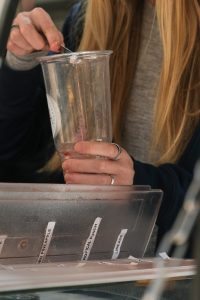
On any given day, numerous Ole Miss students can be seen walking around campus with clear, 32 ounce cups filled with a colorful liquid called “loaded tea.” Loaded teas have circulated across social media and college campuses, but some consumers question the health benefits and risks of these teas.
Operators of The Tea, a campus-favorite food truck located between the student union and the Croft Institute, say they avoid “artificial flavors and preservatives” as well as “aspartame and high fructose corn syrup” in their loaded tea products.
“No other nutrition store has our product,” Riley Severance, sophomore Ole Miss student and manager of The Tea, said. “Our drinks have no sugar and are only 15 calories.”
The drinks are so sweet and energizing that consumers as well as nutritionists ask: What exactly do these loaded teas consist of?
“We cannot give a full ingredient list because the company we use is cautious about giving out that information, but it is not Herbalife,” said an employee of The Tea said.
Herbalife is one of the biggest multi-level marketing meal replacement companies in the United States.
According to Severance, the campus truck serves 200 customers per day on average.
“On a warm day on campus, we can see as many as 400 customers,” Severance said.
Micheal Hays is a graduate student at Ole Miss studying nutrition. Hays has never tried a loaded tea, and said he feels somewhat indifferent toward them.
“I don’t think they are good or bad. I just think there are trade-offs,” Hays said. “Drinking loaded teas that have large amounts of caffeine can cause dehydration, especially if combined with vigorous exercise. However, loaded teas have many healthy compounds like tannins, EGCG and even caffeine itself, which are beneficial. The key is balance and timing consumption of these products to maximize the benefits and limit the potential harm.”

Despite the fact that loaded teas are not cheap — the most basic order starts at $8 a drink — some students get them three or four times a week. Ole Miss sophomore Teddy King says that she relies on loaded teas to help her function.
“The other day I didn’t get one and I had a bad headache. It made me come to the realization that I’m actually addicted to them,” King said.
Ole Miss nutrition professor Melinda Valliant advises against drinking loaded tea despite the immediate energy boost they provide.
“I have had numerous students on campus report experiencing some or all of the following: increased heart rate, abdominal cramping, bloating/diarrhea, trouble sleeping and increased anxiety, all of which subsided when they stopped consuming loaded teas,” Valliant said.
Some students get into the habit of drinking loaded teas as a daily dietary supplement. The amount of central nervous system stimulants the teas contain often makes the consumer feel full after drinking them. This can begin a toxic cycle of malnutrition, depriving the body of fiber, vitamins and minerals from food.
“If an individual consumes a loaded tea instead of eating foods with energy-yielding nutrients, carbohydrates, protein and fats, they won’t have adequate energy to supply their body with fuel, which is particularly concerning for active folks,” Valliant said.
Valliant also warned people about the potential health risks of consuming what is considered an unregulated product.
“A dietary supplement company does not have to prove the safety or efficacy of the product before putting it on the market,” Valliant said. “Only when adverse events are reported and linked back to a product does the company have any responsibility to do so.”
Because these companies do not have to get their products safety tested and FDA approved, there is an abundance of money to spend on marketing and branding. This is why Valliant believes loaded teas are so popular.



























